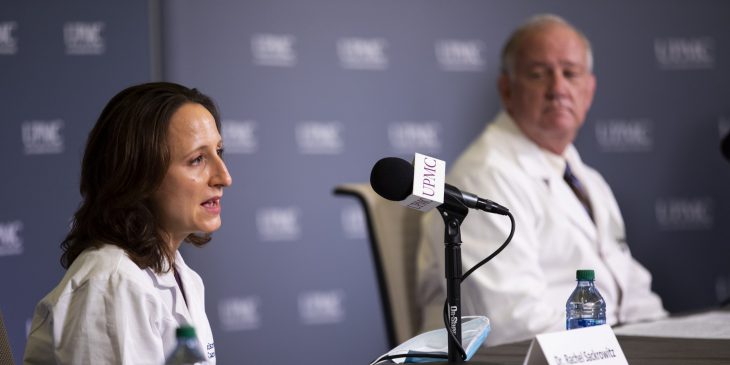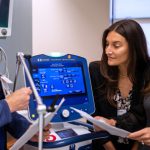With COVID-19 cases on the rise across the three states UPMC serves, the health system remains prepared to care for an increasing number of patients requiring hospital care. At a press briefing today, UPMC leaders encouraged the community to remain vigilant, wear a mask, practice hand hygiene and avoid large gatherings.
Dr. Donald Yealy, UPMC senior medical director and chair of the Department of Emergency Medicine at UPMC and the University of Pittsburgh, noted that it is not a single patient population driving infection. While the virus can affect anyone, the elderly and those with preexisting conditions remain the most vulnerable.
As some regions experience higher rates of infection than others, UPMC can coordinate staff and facilities across the system to provide the care patients need. Across the system, UPMC today has 395 inpatients positive for COVID-19—with the Altoona region and western Maryland, in particular, seeing much higher numbers than earlier in the pandemic. Hospitalizations in southwestern Pennsylvania are approximately the same as in July.
“This underscores why being part of the UPMC system, with resources, facilities and staff that stretch across Pennsylvania and into neighboring states, makes us particularly well-positioned to weather this pandemic,” said Yealy. “When one area needs assistance, the whole system can respond to aid.”
Mortality, ICU admissions and ventilation rates have dropped by 50% since last spring, according to Dr. Rachel Sackrowitz, chief medical officer of the UPMC ICU Service Center and executive vice chair of critical care medicine. This can be attributed to diligent masking and improved treatments generated from the results of REMAP, UPMC’s adaptive clinical trials platform that provides patients with access to breakthroughs in real time.
COVID-19 patients currently occupy less than 7% of UPMC’s nearly 6,000 inpatient beds, and hospitals remain fully able to care for all patients, with or without COVID-19. Should the need arise, UPMC can add and share resources, transfer patients and mobilize staff between facilities.
“I want to express my deepest gratitude to our 90,000-plus dedicated, essential employees,” said Sackrowitz. “It is because of your values – hard work, teamwork and dedication to our health care mission – that Dr. Yealy and I are able to promise our communities that UPMC is prepared to care for them through these unprecedented times.”
UPMC is ready and able to provide the health care patents need, including flu shots, annual physicals and screenings, emergency care and scheduled procedures. Health care facilities have proven to be a safe environment over the last several months, and delaying these types of care in fear of COVID-19 could be detrimental to patient health in the long term, Yealy noted.









